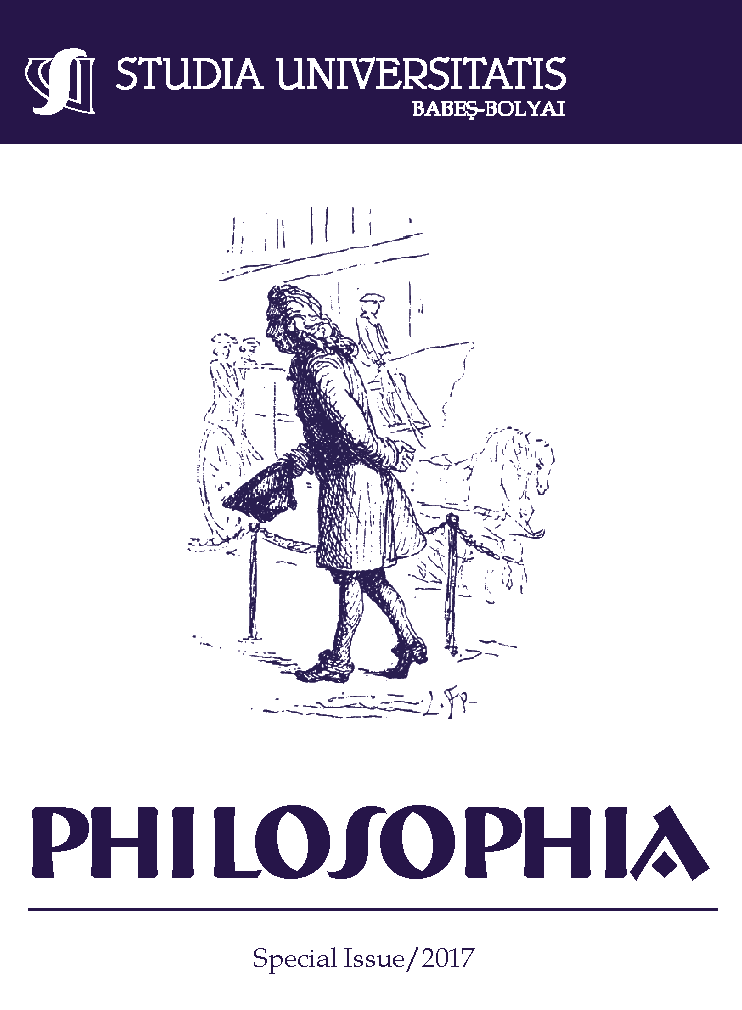THE THEORY OF INTERSUBJECTIVITY IN THE WORK OF ALFRED SCHUTZ
DOI:
https://doi.org/10.24193/subbphil.2017.spiss.04Keywords:
intersubjectivity;the reality of everyday life; the mutual tuning-in relation, We-relationship; Thou-orientation; They-orientation; typifications; subjectivityAbstract
The Theory of Intersubjectivity in the Work of Alfred Schutz. The world of daily life is based on intersubjectivity, on the daily social interactions of the members of the community who live in common, each besides the others, undertaking a multitude of meaningful inter-relating activities sharing in the same time (the living present) and space. The intersubjectivity of the social world is built together with and for the others, whom I may effectively know by directly interacting with them, or whom I may not know at all. My relationship with these others may be of different degrees of closeness (when my experience of another is of a We-type relationship) or of foreignness (when my experience of my contemporary is of a They-type relationship).I’m directly experiencing the other, having immediate access to his subjectivity when we are engaged in a face-to-face interaction, which requires that we share a common sector of space and time.
References
Alfred Schutz meets Herman Dooyeweerd. Accesat la adresa web: http://kgsvr.net/dooy/ext/schutz.html.
Bender, John, Wellbery, David. E., Chronotypes. The construction of time. Standford University Press, Standford California, 1991, pp. 151‒166.
Costelloe, T., Between the Subject and Sociology: Alfred Schutz's Phenomenology of the Life-World. Human Studies, Issue 19(1996), pp. 247‒266.
Grinnell, F., The Problem of lntersubjectivity: A Comparison of Martin Buber and Alfred Schutz. Human Studies, Issue 6(1983), pp. 185‒195.
Hermans, H., Dialogical Self Theory and the increasing multiplicity of I-positions in a Globalizing Society: An introduction. In Applications of Dialogical Self Theory. New directions for Child and adolescent development, Issue 137 (2012), pp. 1‒21.
Hermans, H., Voicing the Self: From Information Processing to Dialogical Interchange. Psychological Bulletin, volume 119, no. 1(1996), pp. 31‒50.
Mead, G. H., Mind, Self and Society: From the Standpoint of a Social Behaviourist. University of Chicago, Chicago, 1934.
Muzzetto, L., Time and Meaning in Alfred Schutz. Time and Society, volume 15, no. 1 (2006), pp. 5‒31.
Natanson, M., Alfred Schutz on social reality and social science. Phenomenology and social reality, chapter Social Reality and Social Science, Martinus Nijhoff, The Hague, Netherlands, 1970.
Ritzer, George, The Blackwell Companion to Major Social Theorists. Blackwell Publishing Ltd, 2003, pp. 290‒333; 355‒376.
Schutz, A., The dimensions of social world. In Der Sinnhafte Aufbbau der sozialen Welt, Vienna, 1932; 2nd ed. 1960 (Sektion IV: Strukturanalyse der Sozialwelt, Soziale Umwelt, Mitwelt, Vorwelt, English adaptation by Professor Thomas Luckmann). In Collected Papers II. Studies in Social Theory. Netherlands: Springer Netherlands, Volume 15 (1976), of the series Phaenomenologica, pp. 20‒63.
Schutz, Alfred, Collected Papers I. On multiple realities. Part III: Symbol, Reality and Society, 1945.
Zaner, R., Theory of intersubjectivity: Alfred Schutz. In Social Research, Vol. 28, No. 1 (1961), pp. 71‒93.
Downloads
Published
How to Cite
Issue
Section
License
Copyright (c) 2017 Studia Universitatis Babeș-Bolyai Philosophia

This work is licensed under a Creative Commons Attribution-NonCommercial-NoDerivatives 4.0 International License.





